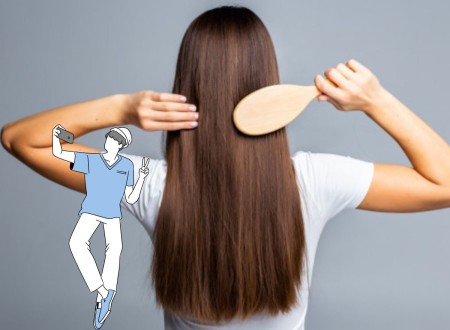Biotin, also known as vitamin H or
vitamin B7, is a water-soluble vitamin that is important for the growth and
maintenance of healthy hair, skin, and nails.
It is known to promote biotin for hair growth by helping the body to convert food into energy, which is necessary for the growth of new cells. It also helps to strengthen the hair shaft, which can prevent hair breakage and thin.
Biotin for hair growth
There are several ways to incorporate
biotin (1) into your diet to
promote hair growth. Some good biotin food sources include,
- Eggs
- Nuts and seeds, particularly almonds, walnuts, and sunflower seeds
- Whole grains
- Legumes, such as lentils and chickpeas
- Dairy products, such as milk and yogurt
- Seafood, such as salmon and halibut
Biotin can also be taken as a supplement
in the form of pills, tablets or capsules. However, it is always recommended to
consult with a healthcare professional before taking any dietary supplements.
They can advise you on the appropriate dosage and monitor any potential side
effects or interactions with any medications you may be taking.
It's also worth noting that hair
growth can also be affected by other factors such as stress, poor diet, and
hormonal imbalances.
Taking care of your hair with a good
hair care routine, eating a well-balanced diet, and addressing any underlying
medical conditions, in addition to incorporating biotin into your diet can have
a more comprehensive benefit to promote hair growth.
Biotin for hair growth can take some
time to produce results; it may take a few months of consistent use to see
improvement. Also, it is important to note that some people may not see any
improvement or could see side effects; in those cases, you should consult your
hair specialist.
Read:
How
Do I Take Care of My Toddlers Curly Hair
How much biotin per day?
The recommended daily intake of biotin
varies depending on age and sex. The Institute of Medicine (IOM) has
established the following recommended daily allowances (RDAs) for biotin,
- Infants up to 6 months: 5 micrograms per day (mcg/day)
- Infants 7-12 months: 6 mcg/day
- Children 1-3 years: 8 mcg/day
- Children 4-8 years: 12 mcg/day
- Children 9-13 years: 20 mcg/day
- Adolescents and adults: 25 mcg/day
- Pregnant and breastfeeding women: 30 mcg/day
Most people can get enough biotin (2) from their
diet, however, some people may benefit from taking biotin supplements.
Taking too much biotin can lead to a biotin overdose and may cause some side effects such as skin rash and acne,
therefore it is essential to consult with a hair care consultant before taking
any supplement, especially if you are taking other medications or have medical
conditions. They can advise you on the appropriate dosage and monitor any
potential side
effects or interactions.
Final Note
Biotin for hair growth specifically,
biotin supplements can be taken in a higher dosage, commonly between 2,500 to 10,000
mcg per day.
However, it is also important to be
aware that the effects of taking these dosages have not been thoroughly studied
and it is not established as safe and effective by scientific evidence, it is
always recommendable to consult your specialists before taking these dosages.
Read: What foods can make your hair fall out

